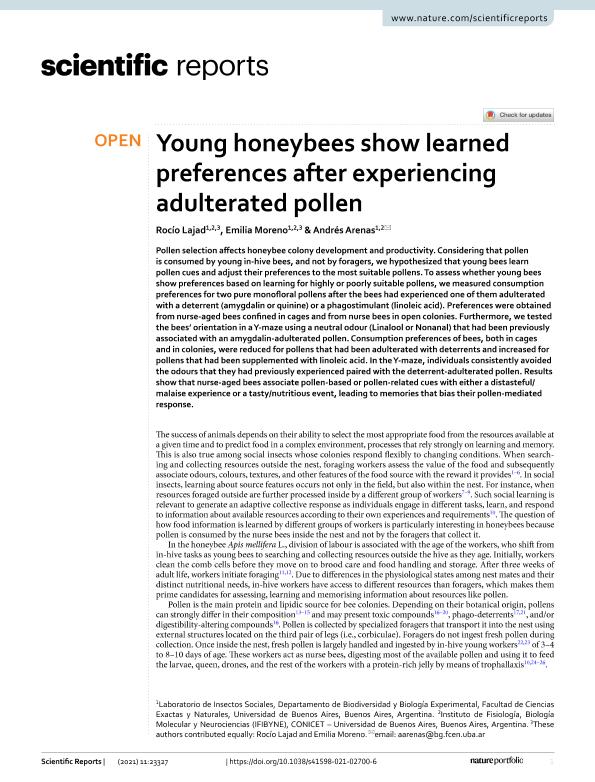Artículo
Young honeybees show learned preferences after experiencing adulterated pollen
Fecha de publicación:
12/2021
Editorial:
Nature
Revista:
Scientific Reports
ISSN:
2045-2322
Idioma:
Inglés
Tipo de recurso:
Artículo publicado
Clasificación temática:
Resumen
Pollen selection affects honeybee colony development and productivity. Considering that pollen is consumed by young in-hive bees, and not by foragers, we hypothesized that young bees learn pollen cues and adjust their preferences to the most suitable pollens. To assess whether young bees show preferences based on learning for highly or poorly suitable pollens, we measured consumption preferences for two pure monofloral pollens after the bees had experienced one of them adulterated with a deterrent (amygdalin or quinine) or a phagostimulant (linoleic acid). Preferences were obtained from nurse-aged bees confined in cages and from nurse bees in open colonies. Furthermore, we tested the bees’ orientation in a Y-maze using a neutral odour (Linalool or Nonanal) that had been previously associated with an amygdalin-adulterated pollen. Consumption preferences of bees, both in cages and in colonies, were reduced for pollens that had been adulterated with deterrents and increased for pollens that had been supplemented with linoleic acid. In the Y-maze, individuals consistently avoided the odours that they had previously experienced paired with the deterrent-adulterated pollen. Results show that nurse-aged bees associate pollen-based or pollen-related cues with either a distasteful/malaise experience or a tasty/nutritious event, leading to memories that bias their pollen-mediated response.
Palabras clave:
Honeybee
,
Pollen
,
Learning
,
young workers
Archivos asociados
Licencia
Identificadores
Colecciones
Articulos(IFIBYNE)
Articulos de INST.DE FISIOL., BIOL.MOLECULAR Y NEUROCIENCIAS
Articulos de INST.DE FISIOL., BIOL.MOLECULAR Y NEUROCIENCIAS
Citación
Lajad, Rocio; Moreno Coellar, Emilia; Arenas, Andres; Young honeybees show learned preferences after experiencing adulterated pollen; Nature; Scientific Reports; 11; 1; 12-2021; 1-11
Compartir
Altmétricas




